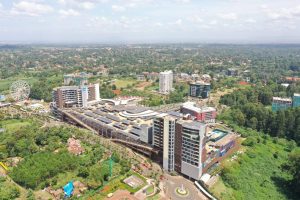The National Treasury has allocated the Presidency Sh2.88 billion more for its recurrent budget, making it one of the top gainers in the revised 2019/2020 public expenditure plans.
Presidency is now among the seven ministries and State departments that have received increments not less than Sh1 billion in the Supplementary Budget.
debt burden is shooting to Sh6.2 trillion
The increment now pushes Presidency’s overall vote to Sh12.29 billion in the current financial year with State House Nairobi getting a lion share of the budget that also saw the First Lady Marget Kenyatta’s office suffer a Sh12.4 million cut.
The Supplementary Budget II which is part of the national treasury’s reaction to the coronavirus pandemic is showing that the recurrent budget for State House has now increased from the initial Sh4.56 billion to Sh5.13 billion.
State House Nairobi also received an extra Sh578.02 million marked as “other operating expenses,” whose budget has risen from Sh1 billion to Sh1.506 billion. State House Mombasa and the State lodges in, Kisumu, Eldoret, Sagana and Kakamega got cuts in their allocations totaling to Sh134.5 million with the budget for State House Nakuru remaining unchanged.

The increment in State House allocations is completely contrasts with austerity measures announced by the government that included an 80% pay cut by top government officials including the president and his deputy.
The move if kept alive would save the country Sh25.68 million annually.
The office of Deputy President William Ruto’s recurrent budget was cut was by Sh32.2 million to Sh2.38 billion while that of his wife Rachel Ruto also slashed by Sh15.8 million.
Reductions in Ruto’s budget is related to Sh18.3 million in domestic travels and Sh13.9 million in basic salaries for permanent staff.
Both the president and his deputy have their salaries cut to Sh288,750 and Sh245,438 respectively after the 80% cut took effect to free more funds to fight the Covid-19 pandemic.
More allocations for State House paints a bleak future for the gains that would come with the pay cuts where Cabinet Secretaries will now earn Sh646,000 or 30% less per month and Principal Secretaries Sh612,150 or 20 % less per month.
These cuts will see taxpayers save Sh2.14 million a month from the presidency and Sh 12.67 million from Cabinet Secretaries and Principal Secretaries as Kenya grapples with the deadly virus from China.
Kenya has 363 confirmed cases of Covid-19 and 14 deaths from the virus that has infected nearly three million people globally, killed close to 200,000.
Other big gainers mini budget also include the State Department for Social Protection, Pensions and Senior Senior Citizens Affairs which received an additional Sh9.994 billion as the government prioritizes the elderly and vulnerable groups to protect them from the wrath of Covid-19.
The State Department of University Education received Sh8.55 billion more while prisons got an additional Sh6.73 billion.
The State Department for Youth was given Sh3.096 billion more and an additional Sh3.5 billion was for National Intelligence Service and Sh3.27 billion for Teachers Service Commission.
But Treasury was the top loser with Sh19.2 billion cut followed by Interior Ministry with Sh3.28 billion and the National Assembly with Sh2.5 billion.
The Treasury is now running on a tight budget since the pandemic also struck when tax revenue is slower than expected despite funding for devolution, social protection and development increasing. gainers-in-mini-budget
Treasury Secretary Ukur Yatani is now fumbling with reduced spending on non-essentials as trips and entertainment to at least get some fiscal space in the budget.
The government was also forced to take key sacrifices that includes lowering value added tax from 16 % to 14 % exempting those earning Sh24,000 and below from paying taxes and lowering resident corporate tax from 30 to 25% which will cost nearly Sh172 billion in foregone taxes.
Kenya is also struggling with deadly flood and desert locust invasion which is now posing a nightmare. Tax collection has gone low with the Kenya Revenue Authority (KRA) posting a flat growth in collections for quarter three (January-March), which is a result of slow down in businesses that had commenced before the pandemic shocks kicked in.


















